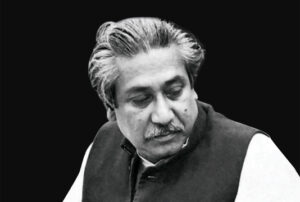Excessive floods and water scarcity – results of unsustainable river management
Dhaka, August 18: People of at least 30 districts out of 64 in Bangladesh are now affected by serious late-monsoon floods due to the onrush of water of common rivers from across the border and incessant rainfall. The floods have already damaged agriculture, vegetable, fruit and fish farms and destroyed dwelling houses and physical infrastructure like roads, highways and rail lines. Experts say 92 percent of the flood water comes from the upper catchments from common rivers while about eight percent generate from local rainfall and stream flows from hills.The International Farakka Committee (IFC) has been telling all for over two decades that excessive flood during the wet season and shortage of water during the dry season in the lower catchments of common rivers is the result of unsustainable management of these natural systems. Due to unplanned construction of a series of dams and barrages at the upper catchments of the Ganges, the Brahmaputra and the Meghna many small rivers in the sub-continent have started dying. In Bangladesh alone 30 rivers in the flood plains of the Ganges now do not have flows in the dry season as they have embraced untimely death. On the other hand, in the absence of adequate flow and current, the big rivers are losing navigability due to formation of shoals and chars and are losing their capacity to carry water to the Bay of Bengal. The rainy season water is thus overflowing their banks and increasing the recurrence of floods.
The people of Bangladesh have not only faced serious destruction of agriculture, industry, fish production, and navigation but also a serious environmental degradation in the Ganges catchment on the southwestern part of the country due to inadequate flow of water in the river. Gorai the main distributary of the Ganges cannot be turned into one having flow in the dry season even after years of capital dredging. To add to the misery the flow of the Teesta in its Bangladesh part has become uncertain. This is because the central government of India, despite making promises, has not succeeded to conclude a treaty with Bangladesh on sharing of its rivers due to opposition from the government of the state of West Bengal. Very recently the Chief Minister of this Indian State Ms Mamata Banarjee has said that the water of the Teesta cannot be shared with Bangladesh because the entire quantum of its water is required for West Bengal.
Against this the honorable Prime Minister of Bangladesh Sheikh Hasina has repeatedly said that the water of the Teesta segment was required in Bangladesh to protect the Northern part of the country from the process of turning arid and sustaining agriculture and the environment. The Prime Minister has demonstrated her foresight by taking position against the talk of construction of a Ganges Barrage in Bangladesh because there is no surety of flow of the river. The International Farakka Committee has congratulated her for this foresight. During the rule of the present government many unsettled problems between the two friendly neighbouring countries have been resolved. The relations between the two neighbours have grown stronger. The people of the country strongly believe that by pursing this friendship it would be possible to solve the unresolved issues and problems. The honorable Prime Minister has been elected a member of an influential UN committee on water. We believe that the Premier would be able to stop the diversion of water of the Teesta river basin to other river basins. Because the transfer of water from one basin to another is prohibited under international law. The
water of the Teesta is now being diverted through the Mahananda and the Ganges on the other side of the Bangladesh-India border to further south. Will it be sustainable to kill the Teesta in its Bangladesh part? Will the people of Bangladesh, who are being denied its flow, accept this?
A tributary of the Brahmaputra, entire water of the Teesta used to flow into Bangladesh and joint the flow of the Brahmaputra for centuries. Now the flow of the river remains obstructed. In other words, if the problem of diversion of water of the Teesta is not resolved, the Gazaldoba barrage constructed on the other side of the border is going to turn into another death trap form the people of Bangladesh. Diversion of water of the Brahmaputra is a part of the River Interlinking Project of the government of India. Under the present BJP government implementation of the project has been resumed with renewed enthusiasm. The people of Bangladesh have waged movement in the early part of the last decade when implementation of this RLP project was initiated. The water and river experts and activists of India are in movement against it and want the people of Bangladesh to remain vocal against the unsustainable activity. Because implementation of this project would cause untimely death of the Himalayan rivers that have kept the subcontinent green and habitable for the millennia. About 1.5 billion people of South Asia will face unprecedented environmental catastrophe as a result. IFC urges all irrespective of political affiliations to remain vocal against the move to prevent the disaster.
Let us raise united voice that the common Himalayan rivers be kept alive through basinwide integrated management on the basis of regional cooperation of people of all the riparian countries of these rivers. All the people living beside these rivers can benefit from services of these natural endowments only if they remain alive. Death of these rivers is inevitable if the present unsustainable development activities on these natural systems continue. And this would be extremely unfortunate and devastating.
We take this opportunity also to urge all concerned to extend their hands of support and cooperation to millions of flood affected people to overcome the ravages of the disaster.
Thank you all
Atiqur Rahman Salu, Chairman and Awlad Hossain Khan, Senior Vice Chairman, IFC, New York.
Prof. Jasim Uddin Ahmad, president and Syed Irfanul Bari, General Secretary, IFC, India.
Mostafa Kamal Majumder, Cordinator, IFC
Cell: 01929334864
(Read out at the press conference held at the National Press Club, Dhaka on 18 August 2018)
IFC is a non-profit, non-political and self-funded environmental and warter rights watch group




